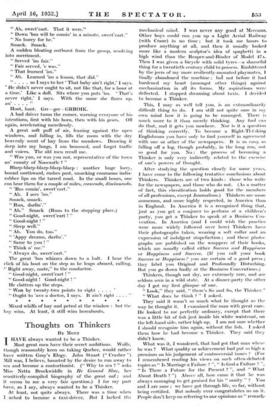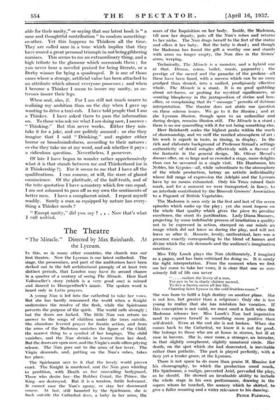Thoughts on Thinkers
BY MOTII
I HAVE always wanted to be a Thinker. -1- Most great men have their secret ambitions. Wolfe, though reasonably keen on taking Quebec, would rather have written Gray's Elegy. John Stuart (" Crasher ") Mill was, I believe, haunted by the desire to run away to sea and become a contortionist. (" Why to sea ? " asks Miss Netts Brockwiddle in He Ground Slow, her sensitively-compiled biography of the great oaf ; and it seems to me a very fair question.) I for my part have, as .1 say, always wanted to be a Thinker.
At least, not quite always. There was a time wheo . ached to become, a taxi-driver. But I lacked the mechanical mind. I was never any good at Meccano. Other boys could run you up a Light Aerial Railway (with Crane) in no time ; but it took me hours to
produce anything at all, and then it usually looked more like a modern sculptor's idea of spaghetti in a
high wind than the Reaper-and-Binder of Model 47A.
Then I was given a bicycle with solid tyres—a shameful thing for a twentieth century child to possess. Embittered by the jeers of my more resiliently-mounted playmates, I finally abandoned the machine ; but not before it had hardened my heart (amongst other things) against mechanization in all its forms. My aspirations were deflected. I stopped dreaming about taxis. I decided to become a Thinker.
This, I may as well tell you, is an extraordinarily difficult thing to do. I am still not quite sure in my own mind how it is going to be managed. There is much more to it than merely thinking. Any fool ean do that, and it gets you nowhere. Nor is it a question of thinking correctly. To become a Right-Th inking Englishman you have only to find yourself in agreement with one or other of the newspapers. It is as cuss as
falling off a log, though probably, in the long run, not so good for you. No: the process of becoming a Thinker is only very indirectly related to the exercise of one's powers. of thought.
After studying the question closely for some yeaes, I have come to the following tentative conclusions about Thinkers. Thinkers am of two kinds : those who write for the newspapers, and those who do not. (As a matter of fact, this classification holds good for the members of all professions, except Journalism.) Thinkers are more numerous, and more highly respected, in America than in England. In America it is a recognized thing that, just as you get a conjurer to perform at a children's party, you get a Thinker to speak at a Business Con- vention, In America (and I could wish the practice were more widely followed over here) Thinkers have their photographs taken, wearing a soft collar and an expression of indulgent stupefaction ; and these photo- graphs are published on the wrappers of their books, which arc usually called either Success and Happiness or Happiness and Success. (If you call your book
Success or Happiness? you arc certain of a good press ; they label you Original and Profoundly Disturbing. But you go down badly at the Business Conventions.)
Thinkers, though not shy, arc extremely rare, and are seldom seen in a wild state. At a dinner-party the other day I got my first glimpse of one.
"Look," they said, "there's So and So, the Thinker." "What does he think ? " I asked.
They said it wasn't so much what he thought as the way he thought it. I examined the man with great care.
He looked to me perfectly ordinary, except that there was a little bit of fish just inside his white waistcoat, on
the left-hand side, rather high up. I am not sure whether I should recognize him again, without the fish. I asked them how he had become a Thinker. They said they didn't know.
• What was it, I wondered, that had got that man where he was ? What quality or achievement had put so high a premium on his judgement of controversial issues ? (For I remembered reading his views on such often-debated topics as" Is Marriage a Failure ? ", "Is God a Failure ? ", "Is There a Future for the Present ? ", and "What About Death ? ") Above all, how came it that he was
always managing to get .praised for his " sanity " ? You and I are sane ; we have got through life, so far,. without being certified. But nobody ever congratulates us on it. People don't keep on referring to our opinions as" remark- able for their sanity," or saying that our latest book is "a sane and thoughtful contribution " to modem. something- or-other. Yet this happens to Thinkers all the time. They are called sane in a tone which implies that they have scored a great personal triumph in not beinggibbering maniacs. This seems to me an extraordinary thing, and a high tribute to the glamour which surrounds them ; for you never hear a novelist praised for being literate, or a Derby winner for bcing a quadruped. It is one of those cases where a strange, artificial value has been attached to an attribute which almost everyone possesses ; and when I become a Thinker I mean to insure my sanity, as ac- tresses insure their legs.
When and, alas, if. For I am still not much nearer to realizing my ambition than on the day when I gave up wanting to drive a taxi-cab. I have told people that I am a Thinker. I have asked them to pass the information on. To those who ask me what I am doing now, I answer : "Thinking." But this never works. Either they mis- take it for a joke, and are politely amused : or else they imagine that I said "Drinking," and register either horror or broadmindedness, according to their natures : or else they take me at my word, and ask whether it pays : a ridiculous question. Nevertheless, I persevere.
Of late I have begun to wonder rather apprehensively what it is that stands between me and Thinkerhood (or is it Thinkership ?). For it seems to me that I have all the qualifications. I can assume, at will, the stare of glazed omniscience. Of the platitude, of the half-truth, and of the trite quotation I have a.mastery which few can equal. I am not ashamed to pass off as my own the sentiments of better men. I have a complacent mind. I repeat myself readily. Surely a man so equipped by nature has every- thing a Thinker needs ?
"Except sanity," did you say ? • Now that's what
I call unkind.









































 Previous page
Previous page